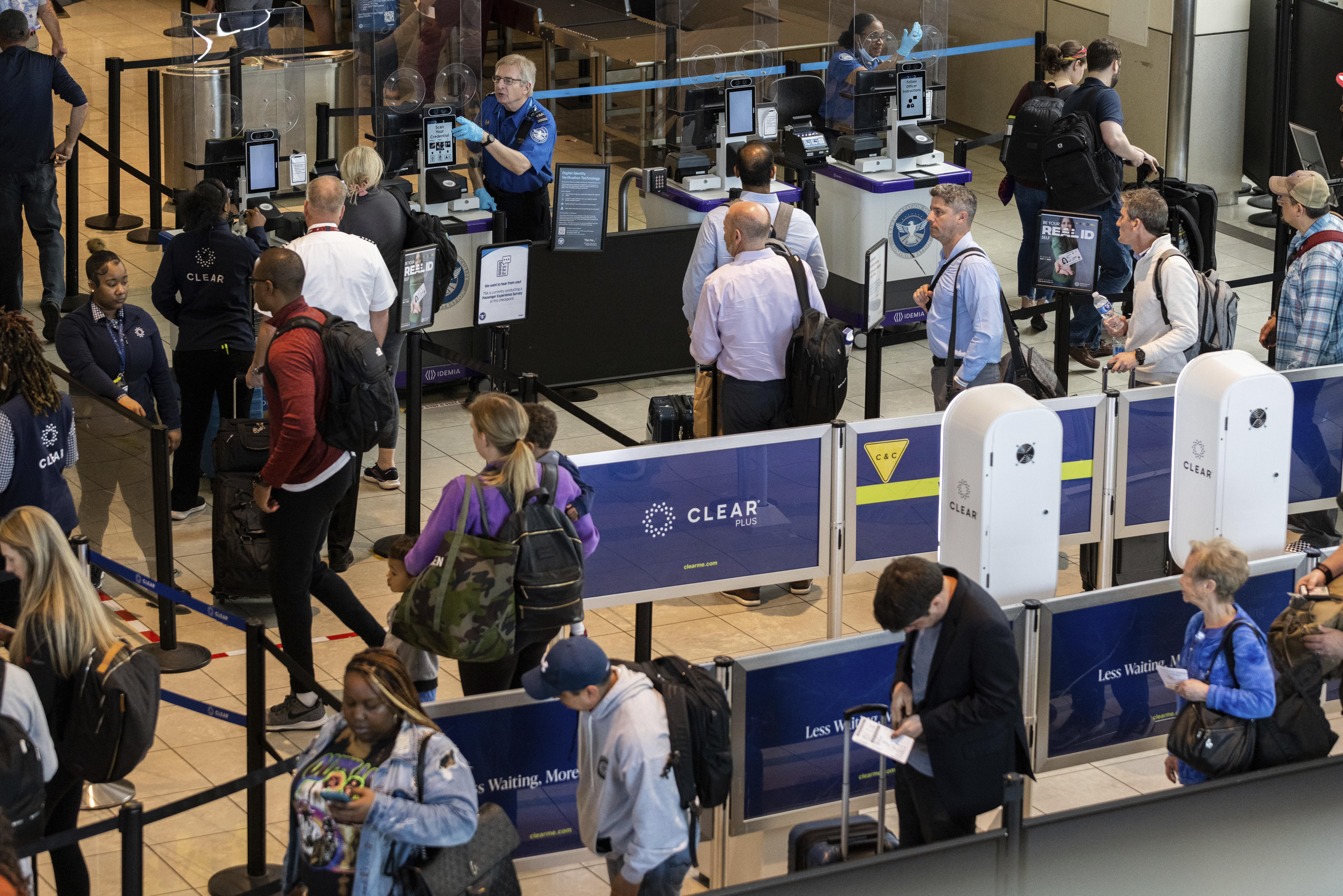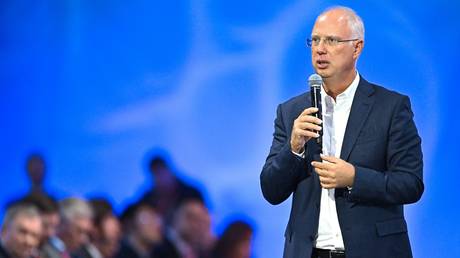The war over who says you’re safe enough to breeze through airport security
CLEAR is under increasing scrutiny for recent security breaches. Now its rival is urging lawmakers to make ID checks mandatory for CLEAR’s members.


Two companies are jockeying for dominance of the market for fast-tracking passengers through airport security lines — and each wants Congress to take its side.
Air travelers could find themselves caught in the middle, if the fight lengthens wait times as demand surges.
The power struggle is part of a recent effort to require all travelers to submit to the Transportation Security Administration’s identification checks. That would include passengers who have been pre-screened by CLEAR, which allows its paying customers to cut to the front of security lines with a biometric scan instead of presenting an ID.
CLEAR is under increasing scrutiny forrecent security breaches — including an incident in which a passenger got through security with a boarding pass dug out of the trash. Now its biggest rival — a company called IDEMIA that performs background checks for TSA PreCheck and makes the agency’s ID-scanning machines — is seizing the moment to urge lawmakers to make ID checks mandatory for CLEAR’s members.
That demand could cut into CLEAR’s business model and potentially gum up security lines that otherwise would be moving faster.
“We wholeheartedly believe that every passenger should have their identification verified at the checkpoint with a [TSA agent] using a CAT machine,” said Lisa Shoemaker, IDEMIA’s vice president of corporate relations, referring to Idemia’s technology that TSA uses to scan IDs.
The skirmish is just the latest in a long-running competition between the two companies, who have lobbied to win increasing shares of the lucrative market to speed up airport security. Adding to the tension, CLEAR and another vendor have won contracts to start providing PreCheck background checks, potentially cutting into IDEMIA’s market share.
An ID check wouldn’t stop CLEAR from escorting passengers to the front of the line, but airline and travel industry analyst Henry Harteveldt suggested that any hiccup in the process could hamper the company’s ability to justify its $189-a-year membership fee.
“CLEAR’s promise to customers is still speed,” Harteveldt said. “And if you are not getting the expedited experience that you are paying for and expect to have, why bother?”
CLEAR, which has said the recent security lapses were due to rogue employees and not its technology, said it has been working with TSA since 2020 on a system that would integrate its biometric screening with TSA’s machines, removing the need for a separate ID check. But that system isn’t online yet, and there’s no timetable for when it would be.
“Biometrics are the strongest form of identity at the checkpoint,” said CLEAR spokesperson Annabel Walsh. She added that TSA has reverified the IDs of 4.7 million CLEAR travelers in the last six months “without citing a single issue.”
The security screening war
CLEAR’s investors include some airlines but not others, adding even more factions to the battle.
According to an industry official, who was granted anonymity to speak candidly about matters before Congress, IDEMIA and American Airlines recently pitched Senate Appropriations Committee aides on language, seen by POLITICO, that would have required all travelers to submit to TSA ID checks. American is not a CLEAR investor.
Shoemaker declined to comment on whether the company pitched the language. American spokesperson Amy Lawrence said, “We appreciate Congress and the Transportation Security Administration taking a leadership role to address this critical aviation security issue.”
But Shoemaker said the company has talked to lawmakers about the need for a valid ID check at the security line. Shoemaker didn’t directly address CLEAR’s processes, instead lauding PreCheck’s procedures, which include an in-person interview, identity documentation and fingerprinting at enrollment that are later cross-referenced at the TSA ID scan. TSA’s enrollment process can take days. CLEAR enrolls people on the spot after scanning an identity document to use on the same day.
Considering IDEMIA’s long-running cooperation with TSA on the PreCheck program, “we believe now is an excellent time to re-evaluate the need for a Registered Traveler program at the checkpoint,” Shoemaker said, referring to CLEAR.
The final language in the Senate bill to fund the Homeland Security Department during the next fiscal year didn’t go quite as far as IDEMIA and American wanted. Instead the bill, released late last month, “strongly encourages” TSA to verify the IDs of all passengers “including passengers enrolled in and escorted by [Registered Traveler] service providers” — in other words, CLEAR.
Also tucked into the spending bill is language that would require TSA to brief the committee on potential security incidents involving CLEAR and a plan to address any security vulnerabilities “created by [Registered Traveler] service providers” — a nod to at least three security incidents involving CLEAR that have alarmed lawmakers and regulators alike.
CLEAR’s security breaches
Those incidents include one in July 2022 in which CLEAR registered a passenger under an ID that wasn’t his, then escorted him through a TSA checkpoint to the baggage screening line even after CLEAR’s systems flagged the identification as mismatched. That fraud wasn’t discovered until days later, when that passenger tried to carry ammunition through a TSA checkpoint at Ronald Reagan Washington National Airport.
Walsh said the company’s technology “was not responsible in any way for this incident” and said the company “took immediate action to end the practice that led to the human error.” CLEAR customers whose IDs didn’t match the company’s biometric system were required to re-enroll in the program, Walsh said.
Two other incidents, including the one where a passenger took a boarding pass out of the garbage, occurred in January and March of this year. They involved passengers that were escorted to the front of the baggage screening line even though they weren’t enrolled in CLEAR. Neither person made it onto a plane.
CLEAR fired the employees responsible for the lapses and their managers, and required all employees to be retrained on CLEAR’s verification process, the company said.
As a result of the recent incidents, and under pressure from lawmakers alarmed at the breaches, TSA said last month that some of CLEAR’s approximately 16 million members would need to show ID instead of just using a biometric scan.
TSA also said all passengers will have to use the same machines the federal agency uses to scan IDs, regardless of membership in CLEAR. But the agency has yet to fully implement that policy and hasn’t said when it will — something Rep. Bennie Thompson of Mississippi, the top Democrat on the House committee that oversees the Homeland Security Department, has criticized.
“Each passing day the homeland is at greater risk until TSA acts to completely close these security vulnerabilities that it was alerted to last year,” Thompson said in a statement. “We cannot afford any additional delay.”
TSA spokesperson R. Carter Langston, responding to questions about requiring all airline passengers to show ID, said, “accurate and reliable verification of passenger identity is foundational to aviation security and effective screening by TSA.” Langston added that the agency has established a timeline for all passengers to use IDEMIA’s CAT machine, though he declined to say when 100 percent of CLEAR users will need to show IDs to a TSA agent.
Though CLEAR is working with TSA to integrate its biometric scans with the agency’s ID technology, there’s no indication when that might be completed. In the meantime, TSA will require a physical ID check as a result of security concerns.
Airlines for America, which represents major U.S. airlines, said it supports TSA’s efforts to enhance passenger screening. Delta and United, both CLEAR investors, referred questions to TSA or CLEAR, with Delta adding it works with “all its airport partners” to ensure the security of its customers.
The security breaches come amid CLEAR’s plans to expand services.
Walsh said CLEAR “welcome discussions with any interested members of Congress to describe our security track record and the role we play in enhancing homeland security and improving the passenger experience.”
Neither company is a novice when it comes to Beltway influence, but both have brought on new heavy hitters recently. CLEAR has hired former Homeland Security Administrator Jeh Johnson, who led the department during the Obama administration. IDEMIA has hired former House Homeland Security Committee ranking member John Katko (R-N.Y.), who shortly before he left office wrote a letter raising concerns about CLEAR’s security procedures. He registered to lobby for IDEMIA five months later.
The ID check push comes after CLEAR won previous rounds of the fight for influence.
IDEMIA was for many years TSA’s sole vendor for PreCheck background vetting — and the company has sought to ensure it stays that way. In 2016, TSA decided to open PreCheck bidding for other companies — and IDEMIA (then known as MorphoTrust) filed a challenge against TSA for it, though the company insisted it wasn’t aimed at jamming the competition.
In 2020, TSA announced that CLEAR and technology-provider Telos would be approved as PreCheck vendors, though neither company has started enrolling passengers yet. The PreCheck contractor expansion poses a significant challenge for IDEMIA, and a big opening for CLEAR.
At the same time, more than 15 million passengers have signed up for TSA’s PreCheck program, which is currently contracted through IDEMIA — though eventually CLEAR will also be able to provide this service.
Harteveldt said CLEAR’s latest security issues could spell trouble for its business. If the company can’t meet strict standards for accuracy when collecting data and authenticating and properly screening passengers, the company’s viability as a business is in question, he said.
“It’s a very cloudy outlook for CLEAR if they cannot rectify these problems that the TSA has raised,” Harteveldt said.












